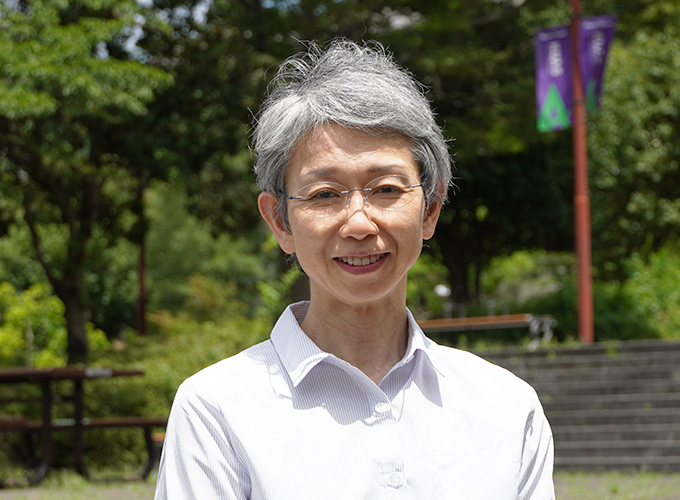Yasuyo Fujii
Professor, Ph.D. in Agriculture
- fujii.yasuyo

- Areas of Research
- Wood Science and Technology, Biomass, Biochar, Bamboo, Sustainable Resource Use
- Profile
- Research
-
Coming from Hyogo Prefecture, Dr. Yasuyo Fujii has always been fascinated with history and chemistry and initially struggled to choose a career path. However, she ended up choosing to study agriculture upon entering university, where she learned about wood science and technology. During her graduate studies, she focused on the growth of bamboo and researched its components. Later, as a postdoctoral fellow, she participated in a project on artificial photosynthesis systems at Kyoto University’s Institute of Advanced Energy, where she constructed an artificial expression system for methanotroph’s methane monooxygenase and a project to produce bioethanol using cellulase from woody biomass.
In 2006, Dr. Fujii joined Kyoto Gakuen University’s (now KUAS) newly established Faculty of Bioenvironmental Sciences as an assistant professor, and she has remained at the institution to this day, currently serving as a professor. She teaches basic chemistry, Chemistry lab, and subjects related to biomass utilization. -
Among biomass resources, the utilization of unused resources will lead to environment-conscious agriculture, including regenerative agriculture, and sustainable energy production. While the use of biomass also requires technological development for high-value-added products, Dr. Fujii believes that introducing more accessible and easier ways to work on it will lead to more widespread use and greater demand for biomass as a resource. Based on this idea, she mainly conducts research on the use of woody biomass, especially bamboo.
To give a specific example, carbon sequestration exists due to carbides. Kameoka City, where KUAS Faculty of Bioenvironmental Sciences is located, has been implementing the “Carbon-negative Project” as an empirical testing ground for the carbon storage effect of carbides in Japan and their impact on agricultural cultivation. Carbon stored by biomass is released into the atmosphere as carbon dioxide at some stage (use or decay) if left unchecked. However, if carbon is mineralized by carbonization, no carbon dioxide is produced unless it is burned. In Japan, there is an ancient farming method that uses charcoal as a soil improvement material. When both are combined, it reduces carbon dioxide emissions and improves the soil, enabling environment-conscious agriculture with benefits including restoration of soil fertility, reduction of the use of chemical fertilizers, and reduction of water pollution caused by nitrogen.
Alternatively, the bamboo is ground into a powder without the use of heat and left anaerobically to produce a lactate-fermented bamboo powder. This fermented bamboo powder has the potential for use in agriculture and animal husbandry and is occasionally commercialized. Some farmers say that growing rice in rice fields sown with powdered bamboo seems to increase soil life, or that vegetables have become tastier due to its application. However, that has not been scientifically verified or proven. Nonetheless, it reveals how bamboo is effective for agriculture by examining soil conditions and growing crops.
If bamboo is used as a carbide material, or if it is proven to be useful, there will be a movement to re-examine bamboo, which is often seen as an obstruction in many areas, and dark, rough and neglected bamboo forests, which are regarded as a problem from the standpoint of the environment and disaster prevention, will decrease.